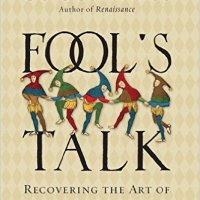
Recently a friend asked me what I thought about women being pastors (or co-pastors) of churches, and what to make of the practice of Christians speaking in tongues in the middle of a church service. These are controversial questions, so I’m sure my comments will step on some toes. But hey, even if we disagree, can’t we all just get along?
Here is what I wrote to my friend.
- Women pastors. This is an easy one (in my opinion). Paul explicitly spells out his list of qualifications for pastors, elders, and deacons (pastors are in many ways equivalent to elders; this can be demonstrated by a Biblical study of the words for pastor, elder, and bishop, but that’s another question altogether). 1 Timothy 3 (see 1 Tim 3:2, 11-12) and Titus 1 (see Tit 1:5-6) are clear that church overseers(=elders) should be the husband of one wife. Furthermore, there is no indication from the Bible (OT or NT) that there were ever any women pastors. Not until recent years historically has the case been made for women pastors, and this has been a post-Enlightenment development. Basically only theological liberals and feminists have tried to argue that women can be pastors, and these folks consciously admit to restructuring Christianity and the church for changing modern times. Those committed to the Bible as Sola Scriptura (the only standard) have rarely even considered that women can be pastors in the church. Some evangelical Christians do believe women can be pastors, but my experience is that they rarely attempt a theological case; they just do it and say “why not”? Now lest I sound misogynist, I believe (along with my seminary professor on this) that a woman can do ANYTHING in the church that a non-ordained man is permitted to do. Women are not less gifted in any way. Yes, they are made female and are thus differently made than males, but it is less a question of constitutional makeup/nature than it is about God-ordained familial roles in the family of God (the Church).
- Speaking in tongues. This is a much more difficult question, since Bible-believing Christians differ on the legitimacy of prophecy and tongues for today. Although I’m firmly convinced from Scripture and personal experience that prophecy and tongues were present in the NT by the work of the Holy Spirit but have ceased as “gifts” since the ending of the apostolic era of the Church, I’m much more willing to accept disagreements on this issue. Read and study Lee Iron’s summary of cessation arguments for a good overview to the cessationist position. On a side note, I’ve heard and read that no one believes anymore the old arguments that prophecy and tongues aren’t for the Church today. That’s a bunch of hooey. It’s either ignorance due to people needing to get out more and learn that the Church is not confined to their particular experience of it, or the fallacy of poisoning the well by ridiculing a position instead of arguing against it.
Here are a couple of web sites and books for further study. Feel free to disagree in the comments, but please no flames or name calling. Let’s have more light–less heat.
Perspectives on Pentecost, by Richard Gaffin. This small book is considered the best argument for the cessation of the NT “sign gifts”.
The Church, by Edmund Clowney. This book is a great introduction to many questions people have regarding the Church. It has chapters on women in the chuch and also on prophecy and tongues.
Nine Marks of a Healthy Church, by Mark Dever. This is a great book to read for those looking for a new church and wondering how to evaluate churches.
9Marks Ministries. Devoted to healthy church life and questions people have about church.
The Council on Biblical Manhood and Womanhood. Comprehensive website helping the Church deal with gender issues.














Wow, I can’t believe no one has commented on this post yet! I just happened upon this blog via a link rabbit trail I was on, so I’m unfamiliar…maybe all your readers simply agree.
However, I would challenge you to check out Dr. Sarah Sumner’s book “Men & Women in the Church: Building Consensus on Christian Leadership”. The author has a Ph.D. from Trinity Evangelical Divinity School and addresses the issue as clearly and concisely as anyone I’ve ever heard, all while doing so in a respectful manner to people on both sides of the issue.
While I agree with you that those ‘in favor’ often do not back their stance with a convincing scriptural argument (which by the way, Sarah Sumner does), I also find those on the ‘against’ side are almost 100% of the time unwilling to look a little deeper into the issue. They view it as a ‘simple’ matter – “this is an easy one” as you put it – and see no need to go any further. I find this response just as unsatisfactory as the prior. I have read fairly extensively on both sides of the issue in a pursuit of finding how to walk out the calling on my own life in a biblically sound, God-honoring way. (Currently my husband is the senior pastor of our church plant, but I regularly share pastoral duties with him.) I find it’s always an ‘easy’ issue for anyone who’s life it doesn’t actually touch in any way. It also feels somewhat hurtful to me that these folks are also so glibly biased that they refuse to attempt to fully understand both positions before rendering their verdict.
While I would agree that Paul was most certainly thinking of a man when he lists his qualifications, he at no point forbids a woman from being an elder. And are single men disqualified as well on the basis of “husband of one wife”? If we resort to the “I do not permit a woman to teach or have authority over a man” verse, then we have a contradiction in allowing women to do the things we do within the church, and “drawing our line” at ordination…can they teach and have authority or not? Where do we find that they can, as long as they don’t have the FINAL authority?
All this to simply point out that for anyone who would have interest or care to delve a little deeper, it’s not quite the easy issue one might think at first glance.
And while I don’t plan to address the tongues portion of this post, one thing did jump out at me…that you are looking for Sola Scriptura for the womens’ issue, but alright with going on your experience with tongues. It’s OK to say…there were no women pastors in the Bible, so we must not have them now, but then say that tongues WAS in the Bible, but is NOT for now? Somehow, there seems to be a bit of contradiction there….
I’m just saying…
That’s my humble and hopefully ‘friendly-fire’ two cents!!
Readers, take note. Jessi’s post is a textbook example of the proper way to disagree in the Spirit of Christ. Thank you, Jessi, for your constructive “friendly-fire” criticism. It is much appreciated.
Before I respond, I just want to say that having a blog is a great way to meet and discuss with different kinds of people. I don’t personally know anyone like Jessi in my circle of friends (although I have crossed paths with evangelical women co-pastors), someone who seems to be well-read and thoughtful about her theology. This is just one of the benefits of blogging.
First, I want to commend Jessi for pointing out my apparent inconsistency with employing the Sola Scriptura argument. I said that Sola Scriptura means scripture as the only standard, but what I should have said was that Sola Scriptura really means that the Bible is the final and higest standard for evaluating and judging truth from error. I certainly recognize other authorities and sources of input when investigating theological and practical questions. Experience and our church confessions (to name a few) should play a large role, just not the weightiest role.
Second, that being said, I don’t think that I’m being inconsistent when I say that the Women as Pastors issue is solely a biblical question, while the Speaking in Tongues issue is a biblical AND experience question. One is an “ought to be” question; the other is an historical question. That is why experience must play a role in the tongues question. Besides, what I have found is that when I make a biblical case for the cessation of tongues, the other person often says something like: “But what about…” and then shares a story of what they’ve heard or seen. So the other person is treating experience as a greater authority than scripture. At this point I usually capitulate (for the sake of argument) and employ the Show Me Your Cards technique. Essentially, I call their bluff. I’ve heard so much talk about how miracles and speaking in tongues still happens today. I’ve seen plenty of the fake manifestations in my Christian life. So I want to see their hand. Show me exhibit A. Be specific. This is where their argument gets very defensive because they cannot demonstrate a verifiable account of a miracle or person speaking in tongues that is on the same level as those testified to in the Bible. Anyway, enough of the tongues debate.
On the issue of Women as Pastors, Jessi’s recommended book looks to be a good one. I have not read it, but I wonder what it’s interpretation of 1 Timothy 3 and Titus 1 is. The way I read Paul, he is instructing Timothy and Titus to appoint/ordain godly men who are blameless inside and outside the church. No polygamists, no drunkards, nobody who doesn’t reflect the grace and knowledge of Christ. I read that Paul’s presupposition is that the Church is to be pastored by men because it images the natural family, which is a creation institution. Moreover, Paul sometimes gives instructions that are founded in the “way things are”, for instance his instructions on head coverings. In my mind, there is good reason to take these as culturally conditioned. However, Paul also gives instructions that are founded in theological reasoning, for instance his instructions that a woman should not have authority over a man (in the church) because it was Eve who was first deceived, not Adam. Tough words to swallow, but Christians must deal with passages like these. Instructions that are grounded in theological truth are binding throughout this age, regardless of how irrelevant they seem to a particular culture. It is the Christian’s duty to hold onto what was passed down to us, and to remain faithful and obedience until our Lord’s return.
Again, I want to restate that I don’t think women are inferior in ANY way to men. Gender-wise, they have been, if anything, MORE faithful than men in the American church over the last few generations. And the 20th century has taught us that women are imminently capable to be leaders in our society. It’s about time men recognized this. So please don’t accuse me of being sexist (which Jessi did not). I’m just trying to be faithful to Scripture and the Christian tradition.
I’ll stop here. Jessi, if you are reading, what is your response?
Nice job Brian on both answers. My only question is this…
Are we trying to make the “woman as pastor” issue fit our own social agenda so it fits what we want as women? Or are we so concerned with making sure that we do what God wants us to, that we will forgo it. I think we have to be careful in these areas because once we start to forgo one thing, we just move on to the next.
I think 1 Tim 2:12-14 talks about a woman having no authority over a man. I’m not trying to render a verdict here, merely giving more information to muddle through. I will say that in this we need rest on the side of caution. The world would say we need to demand our rights, but I think as Christian women we need to walk precariously in this area, but still use the gifting that God has given us. I have never had a problem using my gifts in a more conservative fashion, and God has blessed the work. Plenty of opportunities out there.
One thing that I did consider is the fact the God used Deborah, because there was no one else. In light of what’s happening in the Church today, interesting.
Oi people
I really love the template of dangitbill.wordpress.com. Looks good, keep it up!
anyways..
Im a very “strong” christian and I guess I have a few questions on my mind..
I’ve been thinking a lot about dating.. but im not sure where to go with that.
My coworkers have been telling me christian dating is the way to go.. so I’ve done a little studying on christian dating network and found some stuff on google
Would be great to hear your input.
My thesis is that there is a connection between the present “signs and wonders” or the “tongues” movement and Deut. 28:49. Read more here:
http://www.twoagespilgrims.com/doctrine/?p=358
Nice job Brian!
I’m going to have to agree with you and Catherine on the issue of women in leadership rather than Jessi. I have agonised over this issue for many years and often flitted from one side of the fence to the other but I think my feet are for the moment firmly rooted on your side.
1 Corinthians 14:26 seems to me to permit women contributing in the same way as an unordained man / unappointed elder so I concur that women can be equally gifted in this way.
However as Catherine points out there are no passages which directly support women functioning as elders and yet many which might cast some doubt on it. While I have never fully been able to conclude my understanding of 1 Corinthians 14:34-35 and 1 Timothy 2:9-15, I have determined that to simply cast these verses aside as irrelevant causes problems in itself. The responsibility we have to lead is significant and we will be judged more strictly as a result of it… A leader must therefore be blameless and fully convinced in their own mind. I have yet to be fully convinced that women truly are chosen and appointed by God to function as elders in our churches (might as such a position might be easier to hold) and so I cannot, in clear conscience, support such a view.
Perhaps we ought to view this the same way we have come to view the marriage relationship – if the man is truly filfilling his side then no woman really objects to his headship. In the same way if our male elders are walking closely with the Lord, valuing the input of our female counterparts and equipping and strengthening rather than oppressing and dampening them, then perhaps we would have no contention or problems with this passage either…
I’m less convinced of a cessation doctrine than you but I will agree that at the very least the manifestations of the gifts of the Spirit certainly do not abound everywhere as some might have us believe…
I would like to direct you to a well written and well researched article dealing with this issue.
http://hubpages.com/hub/minister-female